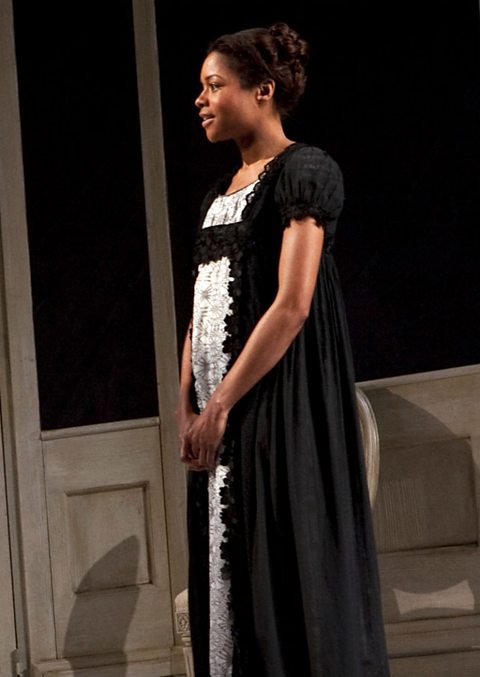Elizabeth Lavenza in Frankenstein

Elizabeth is an orphan child adopted by the Frankensteins. She becomes a devoted daughter, sister and eventually wife to Victor. She is an idealised characterA character who is deliberately presented as being almost too good to be true. who is beautiful, loyal, trusting, sympathetic and caring towards others - almost too perfect. She is, however, human and eventually falls victim to the Monster's revenge on her wedding night.
| How is Elizabeth like this? | Evidence | Analysis | |
| Beautiful | Even when she is a small child, Elizabeth is presented as better looking than the other children in the family in which she is initially bought up. She grows lovelier over the passing years and her good character comes to mirror her good looks. In many ways she reminds Victor of his mother, Caroline - both women die relatively young. | Her hair was the brightest living gold, and despite the poverty of her clothing, seemed to set a crown of distinction on her head. Her brow was clear and ample, her blue eyes cloudless, and her lips and the moulding of her face so expressive of sensibility and sweetness, that none could behold her without looking on her as of a distinct species, a being heaven-sent, and bearing a celestial stamp in all her features. | The imagery which is used to describe Elizabeth concentrates on a) nobility ('living gold', 'crown') and b) religion ('heaven-sent', 'celestial'). She seems like an icon (a religious statue) in a church that is to be worshipped from afar. It is ironic that she is described as though she comes from 'a distinct species' - the reader is reminded here of the origins of the Monster. |
| Idealised | The descriptions of Elizabeth throughout the novel set her apart as a model of beauty, patience, virtue and sympathetic understanding. At the time the novel was written, these would have been considered an ideal of femininity. One of the most important aspects of Elizabeth's character is her ability to influence and appeal to the better nature of others, particularly Victor. | The saintly soul of Elizabeth shone like a shrine-dedicated lamp in our peaceful home. Her sympathy was ours; her smile, her soft voice, the sweet glance of her celestial eyes, were ever there to bless and animate us. She was the living spirit of love to soften and attract: I might have become sullen in my study, rough through the ardour of my nature, but that she was there to subdue me to a semblance of her own gentleness. | Again, religious images are used to describe Elizabeth: 'saintly soul', 'shrine-dedicated lamp', 'celestial eyes', 'bless', 'the living spirit of love' all contribute to this idea. Her ability to calm and influence ('soften and attract') Victor is also shown here. However, it is clear that Victor never exhibits real 'gentleness' as he experiences only 'a semblance' of this. |
| Beautiful | |
|---|---|
| How is Elizabeth like this? | Even when she is a small child, Elizabeth is presented as better looking than the other children in the family in which she is initially bought up. She grows lovelier over the passing years and her good character comes to mirror her good looks. In many ways she reminds Victor of his mother, Caroline - both women die relatively young. |
| Evidence | Her hair was the brightest living gold, and despite the poverty of her clothing, seemed to set a crown of distinction on her head. Her brow was clear and ample, her blue eyes cloudless, and her lips and the moulding of her face so expressive of sensibility and sweetness, that none could behold her without looking on her as of a distinct species, a being heaven-sent, and bearing a celestial stamp in all her features. |
| Analysis | The imagery which is used to describe Elizabeth concentrates on a) nobility ('living gold', 'crown') and b) religion ('heaven-sent', 'celestial'). She seems like an icon (a religious statue) in a church that is to be worshipped from afar. It is ironic that she is described as though she comes from 'a distinct species' - the reader is reminded here of the origins of the Monster. |
| Idealised | |
|---|---|
| How is Elizabeth like this? | The descriptions of Elizabeth throughout the novel set her apart as a model of beauty, patience, virtue and sympathetic understanding. At the time the novel was written, these would have been considered an ideal of femininity. One of the most important aspects of Elizabeth's character is her ability to influence and appeal to the better nature of others, particularly Victor. |
| Evidence | The saintly soul of Elizabeth shone like a shrine-dedicated lamp in our peaceful home. Her sympathy was ours; her smile, her soft voice, the sweet glance of her celestial eyes, were ever there to bless and animate us. She was the living spirit of love to soften and attract: I might have become sullen in my study, rough through the ardour of my nature, but that she was there to subdue me to a semblance of her own gentleness. |
| Analysis | Again, religious images are used to describe Elizabeth: 'saintly soul', 'shrine-dedicated lamp', 'celestial eyes', 'bless', 'the living spirit of love' all contribute to this idea. Her ability to calm and influence ('soften and attract') Victor is also shown here. However, it is clear that Victor never exhibits real 'gentleness' as he experiences only 'a semblance' of this. |